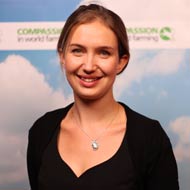
From hands-on clinician to holistic consultant
There has been an evolution in the mindset of production companies from just seeing farm animal welfare as something that has to be done, through to something that is strategically important and offers business opportunities and underpins their brand values, said Jemima Jewell from Compassion in World Farming, speaking at the BVA Congress in London.
There is often a gap between what consumers say they want in terms of the welfare of farm animals and what they actually do and are prepared to pay for. The gap, however, is narrowing; and consumers increasingly look upon the supermarkets to police welfare standards on their behalf.
There is also some pressure from investors in production companies to meet high welfare standards and reduce risks to brand image.
Although meat consumption is still increasing globally at the moment, the consensus view is that it will decrease in the future. This will provide opportunities to raise animals under better welfare conditions with consequent better production. There will be a more holistic approach to welfare; which will be encouraged by investors and their strategic, long-term approach.
With a demand for fewer animals, those remaining will have more space and there will be an opportunity for vets to become involved as consultants rather than simply specialists in clinical intervention.
There will be a need for vets to provide strategic-based advice to production companies on breeding for robustness, herd health planning, and in establishing and monitoring welfare – measured not only in terms of the physical welfare of animals, but also their mental welfare and freedom to express their natural behaviours.
Image courtesy of London Vet Show



 With Strangles Awareness Week just around the corner (5-11 May), vets are being encouraged to share a survey about the disease with their horse-owning clients.
With Strangles Awareness Week just around the corner (5-11 May), vets are being encouraged to share a survey about the disease with their horse-owning clients.